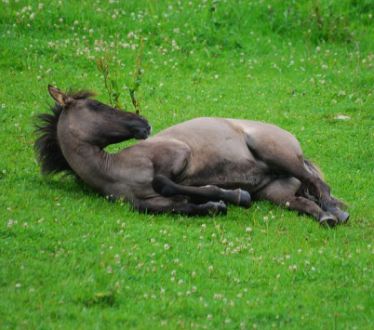Difference between revisions of "Category:Colic - Small Colon Causes"
Jump to navigation
Jump to search
m (Text replace - "Category:Large Intestinal Disorders - Horse" to "Category:Large Intestinal Diseases - Horse") |
|||
| (2 intermediate revisions by the same user not shown) | |||
| Line 1: | Line 1: | ||
| − | + | {{frontpage | |
| − | Abnormalities involving the descending (small) colon are infrequent, accounting for <5% of conditions characterized by colic in one study. The more common causes include: | + | |pagetitle =Small Colon Causes of Colic in Horses |
| − | *''' | + | |pagebody = <div style="text-align: left; direction: ltr; margin-left: 1em;"> |
| − | *''' | + | Abnormalities involving the descending (small) colon are infrequent, accounting for <5% of conditions characterized by colic in one study. The more common causes include: |
| + | *'''Small colon impaction''' | ||
| + | *'''Meconium retention''' | ||
*'''Foreign body obstruction''' | *'''Foreign body obstruction''' | ||
| − | *'''Pelvic masses''': a persistent mild colic may be found when intra-pelvic masses impinge upon the gastro-intestinal tract. Most commonly these are haematomas. Peri-anal lesions, such as | + | *'''Pelvic masses''': a persistent mild colic may be found when intra-pelvic masses impinge upon the gastro-intestinal tract. Most commonly these are haematomas. Peri-anal lesions, such as melanomas may also produce these signs. |
| − | *'''Neurological deficits''': a complete or partial paralysis of the small colon and rectum may occur with | + | *'''Neurological deficits''': a complete or partial paralysis of the small colon and rectum may occur with polyneuritis equi, resulting in a lack of faecal expulsion, and consequent obstruction. A diagnosis is made via a neurological examination. Treatment is palliative only, although the condition can be managed for many years by manual emptying of the rectum. |
| + | </div>|contenttitle =Content | ||
| + | |contentbody =<big><b> | ||
| + | |||
| + | <categorytree mode=pages>Colic - Small Colon Causes</categorytree> | ||
| + | |||
| + | </b></big> | ||
| + | |logo =Rolling horse logo.jpg | ||
| + | }} | ||
| + | |||
| − | |||
| − | |||
[[Category:Colic_in_Horses|D]] | [[Category:Colic_in_Horses|D]] | ||
| − | + | [[Category:Large Intestinal Diseases - Horse]] | |
| − | [[Category:Large Intestinal | ||
Latest revision as of 12:51, 7 January 2011
Small Colon Causes of Colic in Horses
Abnormalities involving the descending (small) colon are infrequent, accounting for <5% of conditions characterized by colic in one study. The more common causes include:
- Small colon impaction
- Meconium retention
- Foreign body obstruction
- Pelvic masses: a persistent mild colic may be found when intra-pelvic masses impinge upon the gastro-intestinal tract. Most commonly these are haematomas. Peri-anal lesions, such as melanomas may also produce these signs.
- Neurological deficits: a complete or partial paralysis of the small colon and rectum may occur with polyneuritis equi, resulting in a lack of faecal expulsion, and consequent obstruction. A diagnosis is made via a neurological examination. Treatment is palliative only, although the condition can be managed for many years by manual emptying of the rectum.
Pages in category "Colic - Small Colon Causes"
The following 6 pages are in this category, out of 6 total.
